🎗️Lonny's War Update- October 460, 2023 - January 8, 2025 🎗️
🎗️Day 460 that 100 of our hostages in Hamas captivity
**There is nothing more important than getting them home! NOTHING!**
“I’ve never met them,But I miss them. I’ve never met them,but I think of them every second. I’ve never met them,but they are my family. BRING THEM HOME NOW!!!”We’re waiting for you, all of you.
A deal is the only way to bring
all the hostages home- the murdered for burial and the living for rehabilitation.
#BringThemHomeNow #TurnTheHorrorIntoHope
A deal is the only way to bring
all the hostages home- the murdered for burial and the living for rehabilitation.
#BringThemHomeNow #TurnTheHorrorIntoHope
There is no victory until all of the hostages are home!אין נצחון עד שכל החטופים בבית
Red Alerts - Missile, Rocket, Drone (UAV - unmanned aerial vehicles), and Terror Attacks and Death Announcements
**
*
*
Hostage Updates
Hostage Updates
'No hostages will be freed until the Gaza war ends’
Gershon Baskin: ‘There’s very little the international community can do to pressure Hamas to make a deal’
All of the Israeli hostages will not return home unless the war in Gaza ends, according to social and political activist Gershon Baskin. “There’s very little the international community can do to pressure Hamas to make a deal,” Baskin told ILTV. “Hamas’s main interest is to end the war, and they’ve been saying this for months.”
Baskin highlighted that it remains unclear if Hamas would be willing to relinquish governmental control of Gaza. He emphasized that this issue must be addressed politically, not just militarily.“The issue of Hamas’s weapons and troops is still undefined, and this is something that Israel has refused to address,” Baskin claimed. “It must be dealt with at the political level, not only the military level, if we want a deal that will bring back all the hostages. All the hostages will not come back until the war is over.” Full video interview on ILTV with Gershon Baskin
'No hostages will be freed until the Gaza war ends’
Gershon Baskin: ‘There’s very little the international community can do to pressure Hamas to make a deal’
All of the Israeli hostages will not return home unless the war in Gaza ends, according to social and political activist Gershon Baskin. “There’s very little the international community can do to pressure Hamas to make a deal,” Baskin told ILTV. “Hamas’s main interest is to end the war, and they’ve been saying this for months.”
PM’s office denies reported proposal of truce in exchange for list of living hostages

Relatives of hostages held in Gaza protest outside the Likud Party headquarters in Tel Aviv, January 8, 2025 (Tomer Neuberg/Flash90)Relatives of hostages held in Gaza protest outside the Likud Party headquarters in Tel Aviv, January 8, 2025 (Tomer Neuberg/Flash90)
Israel denies a report in Lebanese media that talks for a hostage-ceasefire deal are examining the possibility of a truce lasting six to eight weeks, during which Israel would receive a list of the names of all the living hostages.
In a statement, the Prime Minister’s Office calls the report “a complete lie and another part of the psychological warfare that Hamas is trying to inflict on the hostage families and on the citizens of Israel.”
“Israel will continue to work around the clock and tirelessly to bring all of our hostages home,” it says.
Report: Deal proposal would see Israel receive list of living hostages in exchange for 6-8 week Gaza truce
A Lebanese outlet affiliated with Hezbollah says the latest negotiations for a potential hostage-ceasefire deal are examining the possibility of a truce lasting six to eight weeks, during which Israel will receive a list of the names of all the living hostages.
Egyptian sources tell the outlet that Hamas will also formulate a list of dead hostages in the cases “in which the locations of their bodies are known to officials.”
The Cairo officials tell the outlet that during the truce, the amount of aid entering the Strip would increase and work would take place to rebuild the health system in Gaza.
The report says discussions on governance in Gaza after the war have been postponed to a later stage, and that while IDF troops would be expected to remain on the Philadelphi and Netzarim corridors, the status of the Rafah Border Crossing to Egypt remains under discussion by Cairo, Washington and Jerusalem.
A list of 34 names of Israeli hostages held in Gaza who could be released in the first stage of an elusive ceasefire agreement with Hamas was published by a Saudi news outlet Monday, after the Palestinian terror group apparently leaked the document amid reports that negotiators were moving closer to sealing a potential hostage release and ceasefire deal.
That list was swiftly downplayed by Prime Minister Benjamin Netanyahu, whose office said it was the list given by Israel to the mediating countries in July. On Sunday, reports indicated that Hamas had okayed the months-old lineup while refusing to provide information on whether those hostages were alive, which Israel insists on getting before any agreement moves forward.
Hostage families protest outside Likud HQ in Tel Aviv: ‘End the war. Hostage deal now’
The families of some of the hostages held in Gaza protest outside the Likud headquarters in Tel Aviv, calling for a deal that would see them all released.
The protesters block traffic on King George Street as they march with an English-language sign reading: “End the war. Hostage deal now.”
While US officials from the outgoing Biden administration and incoming Trump administration have expressed some optimism at prospects of an agreement being reached, Israel and Hamas meanwhile accused each other of blocking a deal by adhering to conditions that torpedoed all previous negotiations.
Deal being advanced would leave most hostages in Gaza forever, families warn
Following reports of Hamas approving list of 34 captives to be released in temporary ceasefire, relatives call on Netanyahu to strive for comprehensive deal that would free all 100.
The forum representing the vast majority of the remaining 100 hostages in Gaza on Monday called on Prime Minister Benjamin Netanyahu’s government to pursue a comprehensive deal that would see all of their loved ones released, blasting the framework Jerusalem is currently pursuing that would only free roughly one-third of the captives during a temporary ceasefire.
The Hostages Forum held a Tel Aviv press conference featuring four relatives of those being held in Gaza following reports that Hamas had approved a list of 34 hostages that it is prepared to release.
Earlier Monday, a Saudi news outlet published what it said were the names of the hostages on the list, which Netanyahu’s office subsequently maintained was just a recycled list from a previous round of negotiation. A senior Hamas official had told AFP on Sunday that Hamas needed a “week of calm” to locate all of the hostages and ascertain their condition.
A Netanyahu spokesperson rejected the request on Monday, insisting that the terror group is fully up to date on the hostages.
The Hamas official stood by the group’s need for time “to communicate with the captors and identify those who are alive and those who are dead,” while adding that “Hamas has agreed to release the 34 prisoners, whether alive or dead.”
Israel is seeking to maximize the number of living hostages who will be released as part of the deal, while Hamas is looking to hold onto as many hostages as possible so long as Israel plans to resume fighting once the temporary ceasefire is over. Israeli intelligence assesses that as many as half of the hostages are still alive.
The deal being discussed is expected to last six to seven weeks and see the release of the remaining female, elderly and wounded hostages in exchange for hundreds of Palestinian security prisoners and a partial IDF withdrawal from Gaza.
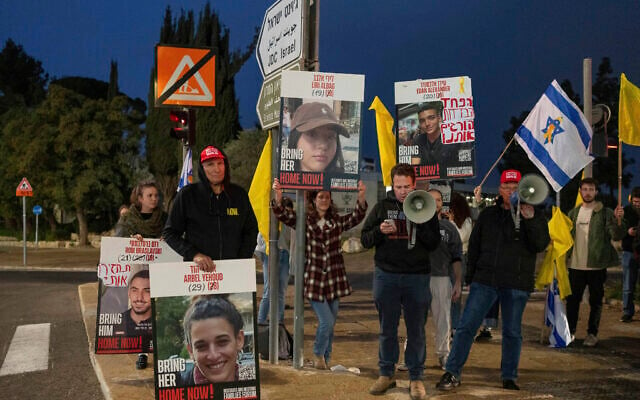 Israeli demonstrators outside the prime minister’s office in Jerusalem hold photos of Liri Albag and other hostages during a protest calling for their release on Sunday, Jan. 5, 2025. (AP Photo/Ohad Zwigenberg)
Israeli demonstrators outside the prime minister’s office in Jerusalem hold photos of Liri Albag and other hostages during a protest calling for their release on Sunday, Jan. 5, 2025. (AP Photo/Ohad Zwigenberg)Netanyahu’s office has preferred the temporary ceasefire framework, with the premier arguing that ending the war permanently in exchange for all of the hostages would allow Hamas to regain control of the Strip. Repeated polls have indicated that the majority of the Israeli public rejects Netanyahu’s approach.
Much of Israel’s security establishment has maintained that Netanyahu’s prosecution of the war contains no exit strategy since he has refused to advance a viable alternative to Hamas’s rule, thereby allowing the terror group to repeatedly return to areas briefly cleared by the IDF. The security establishment and the international community have pushed for allowing the Palestinian Authority, which enjoys limited governing powers over parts of the West Bank, to gain a foothold in Gaza in order to replace Hamas.
Netanyahu has rejected the idea out of hand, likening the PA — which backs a two-state solution — to Hamas. His far-right coalition partners have backed collapsing the PA entirely and would likely threaten to collapse the government if he considers empowering Ramallah.
The security establishment has also backed a more comprehensive deal to free the hostages, arguing that the IDF can return to Gaza if need be and that putting off the release of two-thirds of the hostages not freed in a temporary deal would likely be a death sentence for them.
That point was echoed during Monday’s Hostages Forum press conference in Tel Aviv.
Hostage Nimrod Cohen’s brother Yotam said that Israelis woke up that morning to learn that their government had put together a “Schindler’s List” of 34 hostages who “will be able to hug their families again, while 68 hostages would have their fate sealed.”
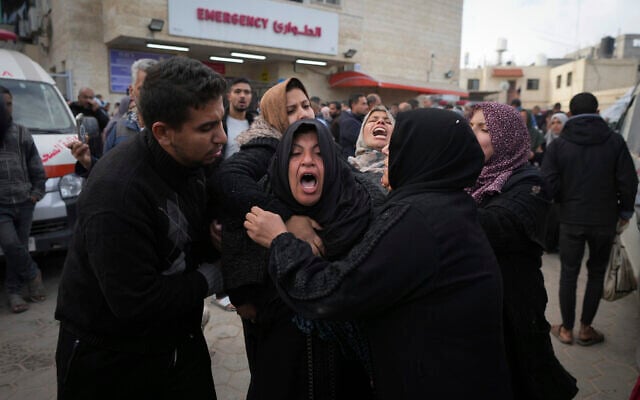 Palestinians mourn their relatives killed in the Israeli bombardment of the Gaza Strip, at Al-Aqsa Martyrs Hospital in Deir al-Balah, Sunday, Jan. 5, 2025. (AP Photo/Abdel Kareem Hana)
Palestinians mourn their relatives killed in the Israeli bombardment of the Gaza Strip, at Al-Aqsa Martyrs Hospital in Deir al-Balah, Sunday, Jan. 5, 2025. (AP Photo/Abdel Kareem Hana)Cohen noted that the current deal could have been implemented months ago, but “the Israeli government avoided and continues to avoid paying the price necessary to save its citizens.”
Indeed, the deal under discussion is roughly the same as the first phase of a three-stage deal Israel proposed last May. Arab and US officials have told The Times of Israel that Netanyahu subsequently added conditions regarding Israel’s withdrawal from the Strip, which torpedoed those talks. However, US Secretary of State Antony Blinken insisted over the weekend that Hamas has been the reason that negotiations have repeatedly collapsed.
Blinken also suggested that the administration has never wanted to publicly blame Netanyahu for blocking a deal, even if he was, due to fear that this would lead Hamas to harden its stance.
The ceasefire that US, Qatari and Egyptian mediators are now trying to advance is still within the three-staged framework, but Israel this time around is much more open about the second and third phases not coming immediately after the first one.
Hamas is demanding assurances from the mediators that there will be some linkage between the first and subsequent phases, as it seeks a permanent ceasefire. Qatar hosted Israeli and Hamas delegations over the weekend for talks, but no breakthroughs have been reported.
“Netanyahu insists on a partial deal that will abandon the remaining hostages to a horrific and terrible death,” Cohen said at the press conference. “My brother Nimrod and the other male soldiers who were kidnapped while performing their duties and young men who escaped from the Nova music festival and managed to save many [before being captured], will rot in [Hamas’s] tunnels forever.”
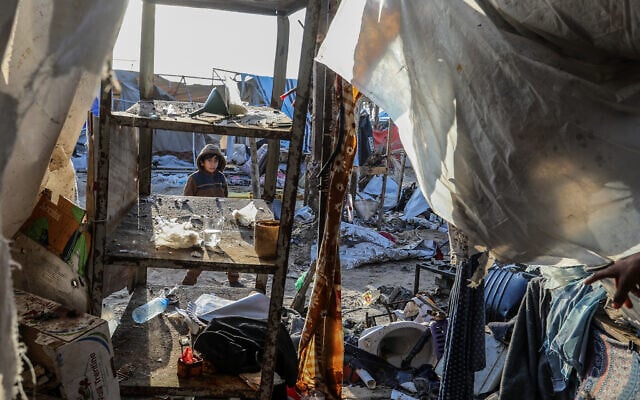 Displaced Palestinians inspect their destroyed tents after an Israeli airstrike in the al-Mawasi humanitarian zone in the southern Gaza Strip, January 6, 2025. (Abed Rahim Khatib/Flash90)
Displaced Palestinians inspect their destroyed tents after an Israeli airstrike in the al-Mawasi humanitarian zone in the southern Gaza Strip, January 6, 2025. (Abed Rahim Khatib/Flash90)“The Israeli government does not have the mandate, nor the legal or moral right, to be selectors and decide who will live and who will die,” Cohen added.
Yaron Or — whose 30-year-old son Avinatan Or was kidnapped by Hamas terrorists during the Hamas onslaught’s raid on the Nova festival — spoke to his son directly during the press conference. “The Israeli prime minister plans to leave you behind for a very long time.
“There won’t be another deal,” yelled Or. “It’s either they all get out now, or Hamas will toy with us for years as they toyed with Hadar Goldin and other hostages.”
Goldin was an IDF officer killed in battle in 2014 whose body has been held by Hamas in Gaza ever since.
Goldin’s sister also addressed the press conference and begged the government not to advance the temporary framework, which she said would divide hostage families.
“I have been standing here for a decade, fighting for the rights of my brother Hadar to return to burial in Israel… We have been saying for a decade that whoever abandons the fallen will abandon the living. Whoever does not seize this historic opportunity will turn everyone into Hadar Goldin… Look at me, I have been your warning sign for 3,800 days.”
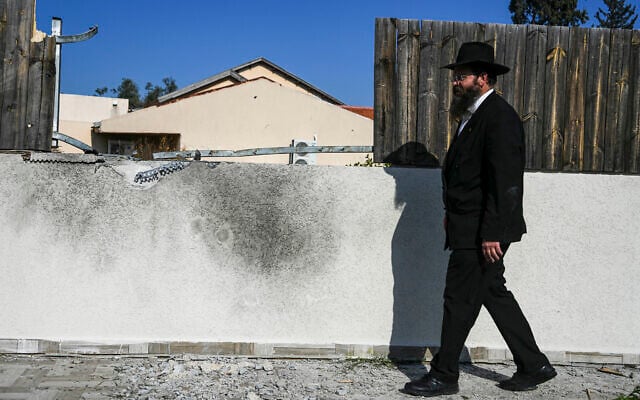 A man surveys a damaged home after a rocket fired by Palestinian terrorists from the Gaza Strip hit in the town of Sderot, southern Israel Monday, Jan. 6, 2025. (AP Photo/Tsafrir Abayov)
A man surveys a damaged home after a rocket fired by Palestinian terrorists from the Gaza Strip hit in the town of Sderot, southern Israel Monday, Jan. 6, 2025. (AP Photo/Tsafrir Abayov)Meirav Leshem Gonen, whose daughter Romi was also taken captive from the Nova festival, addressed incoming US president Donald Trump in English at the press conference.
“You are the most powerful and strongest leader… Please make sure all hostages are coming back home. Please make sure that you are standing with us and do whatever is needed to bring them back,” she said.
The Hostages Families Forum on Monday published and tweeted a list of all 100 hostages held in Gaza, headlined: “The real list of humanitarian hostages is revealed”:
PM’s office denies reported proposal of truce in exchange for list of living hostages

Relatives of hostages held in Gaza protest outside the Likud Party headquarters in Tel Aviv, January 8, 2025 (Tomer Neuberg/Flash90)
Israel denies a report in Lebanese media that talks for a hostage-ceasefire deal are examining the possibility of a truce lasting six to eight weeks, during which Israel would receive a list of the names of all the living hostages.
In a statement, the Prime Minister’s Office calls the report “a complete lie and another part of the psychological warfare that Hamas is trying to inflict on the hostage families and on the citizens of Israel.”
“Israel will continue to work around the clock and tirelessly to bring all of our hostages home,” it says.
A Lebanese outlet affiliated with Hezbollah says the latest negotiations for a potential hostage-ceasefire deal are examining the possibility of a truce lasting six to eight weeks, during which Israel will receive a list of the names of all the living hostages.
Egyptian sources tell the outlet that Hamas will also formulate a list of dead hostages in the cases “in which the locations of their bodies are known to officials.”
The Cairo officials tell the outlet that during the truce, the amount of aid entering the Strip would increase and work would take place to rebuild the health system in Gaza.
The report says discussions on governance in Gaza after the war have been postponed to a later stage, and that while IDF troops would be expected to remain on the Philadelphi and Netzarim corridors, the status of the Rafah Border Crossing to Egypt remains under discussion by Cairo, Washington and Jerusalem.
A list of 34 names of Israeli hostages held in Gaza who could be released in the first stage of an elusive ceasefire agreement with Hamas was published by a Saudi news outlet Monday, after the Palestinian terror group apparently leaked the document amid reports that negotiators were moving closer to sealing a potential hostage release and ceasefire deal.
That list was swiftly downplayed by Prime Minister Benjamin Netanyahu, whose office said it was the list given by Israel to the mediating countries in July. On Sunday, reports indicated that Hamas had okayed the months-old lineup while refusing to provide information on whether those hostages were alive, which Israel insists on getting before any agreement moves forward.
Hostage families protest outside Likud HQ in Tel Aviv: ‘End the war. Hostage deal now’
The families of some of the hostages held in Gaza protest outside the Likud headquarters in Tel Aviv, calling for a deal that would see them all released.
The protesters block traffic on King George Street as they march with an English-language sign reading: “End the war. Hostage deal now.”
While US officials from the outgoing Biden administration and incoming Trump administration have expressed some optimism at prospects of an agreement being reached, Israel and Hamas meanwhile accused each other of blocking a deal by adhering to conditions that torpedoed all previous negotiations.
Deal being advanced would leave most hostages in Gaza forever, families warn
Following reports of Hamas approving list of 34 captives to be released in temporary ceasefire, relatives call on Netanyahu to strive for comprehensive deal that would free all 100.
The forum representing the vast majority of the remaining 100 hostages in Gaza on Monday called on Prime Minister Benjamin Netanyahu’s government to pursue a comprehensive deal that would see all of their loved ones released, blasting the framework Jerusalem is currently pursuing that would only free roughly one-third of the captives during a temporary ceasefire.
The Hostages Forum held a Tel Aviv press conference featuring four relatives of those being held in Gaza following reports that Hamas had approved a list of 34 hostages that it is prepared to release.
Earlier Monday, a Saudi news outlet published what it said were the names of the hostages on the list, which Netanyahu’s office subsequently maintained was just a recycled list from a previous round of negotiation. A senior Hamas official had told AFP on Sunday that Hamas needed a “week of calm” to locate all of the hostages and ascertain their condition.
A Netanyahu spokesperson rejected the request on Monday, insisting that the terror group is fully up to date on the hostages.
The Hamas official stood by the group’s need for time “to communicate with the captors and identify those who are alive and those who are dead,” while adding that “Hamas has agreed to release the 34 prisoners, whether alive or dead.”
Israel is seeking to maximize the number of living hostages who will be released as part of the deal, while Hamas is looking to hold onto as many hostages as possible so long as Israel plans to resume fighting once the temporary ceasefire is over. Israeli intelligence assesses that as many as half of the hostages are still alive.
The deal being discussed is expected to last six to seven weeks and see the release of the remaining female, elderly and wounded hostages in exchange for hundreds of Palestinian security prisoners and a partial IDF withdrawal from Gaza.

Netanyahu’s office has preferred the temporary ceasefire framework, with the premier arguing that ending the war permanently in exchange for all of the hostages would allow Hamas to regain control of the Strip. Repeated polls have indicated that the majority of the Israeli public rejects Netanyahu’s approach.
Much of Israel’s security establishment has maintained that Netanyahu’s prosecution of the war contains no exit strategy since he has refused to advance a viable alternative to Hamas’s rule, thereby allowing the terror group to repeatedly return to areas briefly cleared by the IDF. The security establishment and the international community have pushed for allowing the Palestinian Authority, which enjoys limited governing powers over parts of the West Bank, to gain a foothold in Gaza in order to replace Hamas.
Netanyahu has rejected the idea out of hand, likening the PA — which backs a two-state solution — to Hamas. His far-right coalition partners have backed collapsing the PA entirely and would likely threaten to collapse the government if he considers empowering Ramallah.
The security establishment has also backed a more comprehensive deal to free the hostages, arguing that the IDF can return to Gaza if need be and that putting off the release of two-thirds of the hostages not freed in a temporary deal would likely be a death sentence for them.
That point was echoed during Monday’s Hostages Forum press conference in Tel Aviv.
Hostage Nimrod Cohen’s brother Yotam said that Israelis woke up that morning to learn that their government had put together a “Schindler’s List” of 34 hostages who “will be able to hug their families again, while 68 hostages would have their fate sealed.”

Cohen noted that the current deal could have been implemented months ago, but “the Israeli government avoided and continues to avoid paying the price necessary to save its citizens.”
Indeed, the deal under discussion is roughly the same as the first phase of a three-stage deal Israel proposed last May. Arab and US officials have told The Times of Israel that Netanyahu subsequently added conditions regarding Israel’s withdrawal from the Strip, which torpedoed those talks. However, US Secretary of State Antony Blinken insisted over the weekend that Hamas has been the reason that negotiations have repeatedly collapsed.
Blinken also suggested that the administration has never wanted to publicly blame Netanyahu for blocking a deal, even if he was, due to fear that this would lead Hamas to harden its stance.
The ceasefire that US, Qatari and Egyptian mediators are now trying to advance is still within the three-staged framework, but Israel this time around is much more open about the second and third phases not coming immediately after the first one.
Hamas is demanding assurances from the mediators that there will be some linkage between the first and subsequent phases, as it seeks a permanent ceasefire. Qatar hosted Israeli and Hamas delegations over the weekend for talks, but no breakthroughs have been reported.
“Netanyahu insists on a partial deal that will abandon the remaining hostages to a horrific and terrible death,” Cohen said at the press conference. “My brother Nimrod and the other male soldiers who were kidnapped while performing their duties and young men who escaped from the Nova music festival and managed to save many [before being captured], will rot in [Hamas’s] tunnels forever.”

“The Israeli government does not have the mandate, nor the legal or moral right, to be selectors and decide who will live and who will die,” Cohen added.
Yaron Or — whose 30-year-old son Avinatan Or was kidnapped by Hamas terrorists during the Hamas onslaught’s raid on the Nova festival — spoke to his son directly during the press conference. “The Israeli prime minister plans to leave you behind for a very long time.
“There won’t be another deal,” yelled Or. “It’s either they all get out now, or Hamas will toy with us for years as they toyed with Hadar Goldin and other hostages.”
Goldin was an IDF officer killed in battle in 2014 whose body has been held by Hamas in Gaza ever since.
Goldin’s sister also addressed the press conference and begged the government not to advance the temporary framework, which she said would divide hostage families.
“I have been standing here for a decade, fighting for the rights of my brother Hadar to return to burial in Israel… We have been saying for a decade that whoever abandons the fallen will abandon the living. Whoever does not seize this historic opportunity will turn everyone into Hadar Goldin… Look at me, I have been your warning sign for 3,800 days.”

Meirav Leshem Gonen, whose daughter Romi was also taken captive from the Nova festival, addressed incoming US president Donald Trump in English at the press conference.
“You are the most powerful and strongest leader… Please make sure all hostages are coming back home. Please make sure that you are standing with us and do whatever is needed to bring them back,” she said.
The Hostages Families Forum on Monday published and tweeted a list of all 100 hostages held in Gaza, headlined: “The real list of humanitarian hostages is revealed”:
- Gaza hostage deal: KAN reveals doc. outlining Israel's negotiation terms
The document also reveals the details of the deal under negotiation.
The Israeli document that forms the basis of the hostage negotiation talks in Doha, Qatar was published by Israeli public broadcaster KAN on Tuesday evening.
The Hebrew version of the document has been presented to the security cabinet.
"The purpose of the agreement is the release of all Israeli hostages held in Gaza—civilians and soldiers, whether alive or not—taken at any time, in exchange for an agreed-upon number of Palestinian prisoners held in Israeli prisons, and the establishment of lasting quiet, leading to a permanent ceasefire, the withdrawal of Israeli forces from the Gaza Strip, and the rehabilitation of the Strip," the document stated. The document also reveals the details of the deal being negotiated. It specifies how Israel will withdraw from central Gaza, "mainly from the Netzarim corridor," and fully dismantle military outposts.
The document also outlines how the IDF will allow humanitarian aid into Gaza as soon as the deal comes into effect, and how Hamas will agree to release the hostages, starting with women.
"On the first day, three Israeli female hostages [will be released], on the seventh day, four more female hostages, and subsequently, three hostages every seven days—starting with those who are alive," the document states.
The document also iterates details on the list of hostages Hamas must provide. It states that by the seventh day, Hamas must provide information on the number of hostages to be released in the first humanitarian stage.
According to KAN, while in this document Israel demands the deportation of at least 50 Hamas terrorists either abroad or to Gaza, it is now demanding a higher number.
Ending the war?
The document also reveals the details of the deal under negotiation.
The Israeli document that forms the basis of the hostage negotiation talks in Doha, Qatar was published by Israeli public broadcaster KAN on Tuesday evening.
The Hebrew version of the document has been presented to the security cabinet.
"The purpose of the agreement is the release of all Israeli hostages held in Gaza—civilians and soldiers, whether alive or not—taken at any time, in exchange for an agreed-upon number of Palestinian prisoners held in Israeli prisons, and the establishment of lasting quiet, leading to a permanent ceasefire, the withdrawal of Israeli forces from the Gaza Strip, and the rehabilitation of the Strip," the document stated. The document also reveals the details of the deal being negotiated. It specifies how Israel will withdraw from central Gaza, "mainly from the Netzarim corridor," and fully dismantle military outposts.
The document also outlines how the IDF will allow humanitarian aid into Gaza as soon as the deal comes into effect, and how Hamas will agree to release the hostages, starting with women.
"On the first day, three Israeli female hostages [will be released], on the seventh day, four more female hostages, and subsequently, three hostages every seven days—starting with those who are alive," the document states.
The document also iterates details on the list of hostages Hamas must provide. It states that by the seventh day, Hamas must provide information on the number of hostages to be released in the first humanitarian stage.
According to KAN, while in this document Israel demands the deportation of at least 50 Hamas terrorists either abroad or to Gaza, it is now demanding a higher number.
In the first stage, Prime Minister Benjamin Netanyahu has already approved initiating post-war reconstruction in Gaza which will include rebuilding infrastructure, clearing rubble, and bringing in at least 60,000 caravans and 200,000 tents.
The second stage of the agreement states that there will be "a permanent cessation of military operations and all hostile activities, with the implementation of quiet." link
-
Liam Or tells Omar Wenkert's mother what they went through in captivity: "He knew he wouldn’t be able to handle the longing"
For 54 days, the teenager Liam from Re’im was held in a tunnel in Gaza with 22-year-old Omar.
• They became close friends there and were sure Omar would be released a few days after Liam.
• But more than 400 days have passed, and in an open conversation with Niva Wenkert, Liam shared the details of their time in captivity: how he hid painkillers for Omar, the harsh conditions, the lack of food—and even their initial connection: "I must mention the belly he was so proud of."
The abduction and the ordeal
Liam Or was kidnapped from his home in Kibbutz Re’im on October 7 and was released from captivity after 54 days in Gaza. Throughout his captivity, he was with Omar Vankret, who remains in Gaza.
In the "Central Edition" yesterday (Monday), a moving conversation was broadcast between Liam and Niva, Omar's mother. Liam shared details about Omar's captivity, how they survived hunger and abuse, how Omar coped with his chronic intestinal illness, and what Liam requested of the captors when he was released, leaving Omar behind.
On the shelter and abduction
Although they were abducted from different locations, Niva asked Liam to tell her what Omar shared about the abduction itself.
“They were in a shelter, and there were gunshots and chaos. There was a lot of blood. He said he was wearing a white shirt with bloodstains on it and thought, ‘How will I explain this to my mom?’
“The militants burned a tire at the entrance of the shelter to choke them and force them out. Omar was lying under bodies—some dead, some alive. He decided to get up, saying, ‘I’d rather not die from suffocation; I’d prefer to be shot.’ When he realized they weren’t shooting, he hesitated for a moment—whether to go back inside or maybe try to escape.
“They stripped him of his clothes and started driving him to Gaza. In the truck, they told him, ‘You’ll be like Sharon Arad’ (a mistake by the captors). He said he wanted to leave some sign for his family, so he stuck his head out when they took pictures.”
Niva: “When I saw Omar’s gaze straight into the camera, I had a glimmer of hope because I recognized that look and knew it wasn’t random—that he knew what he was doing.”
Twenty-two-year-old Omar had arrived at Nova with his close friend, Kim Damti, who was later killed. Since then, his family has neither seen him nor heard his voice. The footage of Omar, bound and beaten in a Hamas truck, is the image Niva carries to bed every night.
Kim Damti z"l, Omer's girlfriend
In the tunnel and captivity
Liam: “I’d rather not talk about the beatings. We were tied with our hands behind our backs. When they removed my blindfold, I saw Omar. I have to mention his belly, which he was so proud of. There were also some Thai workers. I asked Omar if he thought we would survive, and he said he was sure everything would be okay.”
Omar suffers from colitis, a severe chronic intestinal disease that requires regular treatment and monitoring.
“The first thing the captors wanted to know was if we were soldiers. I said I was pre-enlistment, and Omar said he hadn’t enlisted because of his colitis. They didn’t give it much importance. As days passed, his stomach began to hurt, and he asked for medication. They gave him paracetamol. I requested some too, and would give it to Omar or save it. The specific medicine he needed was not provided.
Niva Wenkert
“In the evening, we received half a pita—sometimes empty, sometimes with yellow cheese, sometimes with crumbs of halva. On the 27th day, we were given lentils. We were in shock. A few days earlier, we got a packaged croissant-like sponge cake. We cleaned the packaging with a bit of water and used it to store food later.
“The captors treated us horribly. For the first two to three weeks, we didn’t even get dates. One captor told us, ‘Every time you get three dates, know that another day has passed.’”
Niva exclaimed: “But Omar doesn’t like dates!”
Liam: “He had no choice—it was sugar, and over time, he got used to it. Once we received a piece of deli meat, which he wasn’t supposed to eat either. We got 600 milliliters of water for three people.”
Niva: “Wow, how did he manage? He’s someone who needs gallons of water.”
“When the captors left, we stopped eating and put a spoonful of lentils into the packaging we had saved. Later, when we got more pitas, we ate only a bit, saving the lentils for another time.
“He said he knew you were strong and were there for him. When we talked about what we would do if we got a phone call home, he said he wouldn’t speak to his parents because he knew he couldn’t handle the longing. He preferred that I talk to you and tell you he’s okay, that he’s strong, and that everything will be fine in the end.”
On parting and hope
“When I said goodbye, we thought he would be released a few days after me. He told me, ‘Talk to my family and friends, but wait for me to go to the beach—we’ll go together.’”
Niva: “I don’t understand; he’s not even that into the beach.” To her surprise, Liam said Omar wanted to perform the Tashlich ritual and had done so several times before.
On longing
“I dreamed several times that I saw my mom and dad and hugged them—and Omar too. You’re just waiting for the moment you close your eyes and enter another world. The dreams are very vivid. In the early morning hours, that’s what we did—we talked about our dreams.
“When they took me out of the room, I told the captors to make sure Omar wasn’t alone. I told them he was afraid of the dark, to leave the door open, ‘One of you should sleep next to him. You’re eight; he’s one.’
“I can only smile halfway. He’s such a big part of my life. To many, Omar Wenkert might just be a photo, but he’s a person. Funny, hilarious, who just wants to come home. To go to the bathroom without someone threatening him during it.” LINK
Liam Or tells Omar Wenkert's mother what they went through in captivity: "He knew he wouldn’t be able to handle the longing"
For 54 days, the teenager Liam from Re’im was held in a tunnel in Gaza with 22-year-old Omar.
• They became close friends there and were sure Omar would be released a few days after Liam.
• But more than 400 days have passed, and in an open conversation with Niva Wenkert, Liam shared the details of their time in captivity: how he hid painkillers for Omar, the harsh conditions, the lack of food—and even their initial connection: "I must mention the belly he was so proud of."
The abduction and the ordeal
Liam Or was kidnapped from his home in Kibbutz Re’im on October 7 and was released from captivity after 54 days in Gaza. Throughout his captivity, he was with Omar Vankret, who remains in Gaza.
In the "Central Edition" yesterday (Monday), a moving conversation was broadcast between Liam and Niva, Omar's mother. Liam shared details about Omar's captivity, how they survived hunger and abuse, how Omar coped with his chronic intestinal illness, and what Liam requested of the captors when he was released, leaving Omar behind.
On the shelter and abduction
Although they were abducted from different locations, Niva asked Liam to tell her what Omar shared about the abduction itself.
“They were in a shelter, and there were gunshots and chaos. There was a lot of blood. He said he was wearing a white shirt with bloodstains on it and thought, ‘How will I explain this to my mom?’
“The militants burned a tire at the entrance of the shelter to choke them and force them out. Omar was lying under bodies—some dead, some alive. He decided to get up, saying, ‘I’d rather not die from suffocation; I’d prefer to be shot.’ When he realized they weren’t shooting, he hesitated for a moment—whether to go back inside or maybe try to escape.
“They stripped him of his clothes and started driving him to Gaza. In the truck, they told him, ‘You’ll be like Sharon Arad’ (a mistake by the captors). He said he wanted to leave some sign for his family, so he stuck his head out when they took pictures.”
Niva: “When I saw Omar’s gaze straight into the camera, I had a glimmer of hope because I recognized that look and knew it wasn’t random—that he knew what he was doing.”
Twenty-two-year-old Omar had arrived at Nova with his close friend, Kim Damti, who was later killed. Since then, his family has neither seen him nor heard his voice. The footage of Omar, bound and beaten in a Hamas truck, is the image Niva carries to bed every night.
In the tunnel and captivity
Liam: “I’d rather not talk about the beatings. We were tied with our hands behind our backs. When they removed my blindfold, I saw Omar. I have to mention his belly, which he was so proud of. There were also some Thai workers. I asked Omar if he thought we would survive, and he said he was sure everything would be okay.”
Omar suffers from colitis, a severe chronic intestinal disease that requires regular treatment and monitoring.
“The first thing the captors wanted to know was if we were soldiers. I said I was pre-enlistment, and Omar said he hadn’t enlisted because of his colitis. They didn’t give it much importance. As days passed, his stomach began to hurt, and he asked for medication. They gave him paracetamol. I requested some too, and would give it to Omar or save it. The specific medicine he needed was not provided.
“In the evening, we received half a pita—sometimes empty, sometimes with yellow cheese, sometimes with crumbs of halva. On the 27th day, we were given lentils. We were in shock. A few days earlier, we got a packaged croissant-like sponge cake. We cleaned the packaging with a bit of water and used it to store food later.
“The captors treated us horribly. For the first two to three weeks, we didn’t even get dates. One captor told us, ‘Every time you get three dates, know that another day has passed.’”
Niva exclaimed: “But Omar doesn’t like dates!”
Liam: “He had no choice—it was sugar, and over time, he got used to it. Once we received a piece of deli meat, which he wasn’t supposed to eat either. We got 600 milliliters of water for three people.”
Niva: “Wow, how did he manage? He’s someone who needs gallons of water.”
“When the captors left, we stopped eating and put a spoonful of lentils into the packaging we had saved. Later, when we got more pitas, we ate only a bit, saving the lentils for another time.
“He said he knew you were strong and were there for him. When we talked about what we would do if we got a phone call home, he said he wouldn’t speak to his parents because he knew he couldn’t handle the longing. He preferred that I talk to you and tell you he’s okay, that he’s strong, and that everything will be fine in the end.”
On parting and hope
“When I said goodbye, we thought he would be released a few days after me. He told me, ‘Talk to my family and friends, but wait for me to go to the beach—we’ll go together.’”
Niva: “I don’t understand; he’s not even that into the beach.” To her surprise, Liam said Omar wanted to perform the Tashlich ritual and had done so several times before.
On longing
“I dreamed several times that I saw my mom and dad and hugged them—and Omar too. You’re just waiting for the moment you close your eyes and enter another world. The dreams are very vivid. In the early morning hours, that’s what we did—we talked about our dreams.
“When they took me out of the room, I told the captors to make sure Omar wasn’t alone. I told them he was afraid of the dark, to leave the door open, ‘One of you should sleep next to him. You’re eight; he’s one.’
“I can only smile halfway. He’s such a big part of my life. To many, Omar Wenkert might just be a photo, but he’s a person. Funny, hilarious, who just wants to come home. To go to the bathroom without someone threatening him during it.” LINK
Gaza and the South
- In IDF interrogation, Hamas member says gunmen operated from inside Gaza’s Kamal Adwan Hospital
The IDF releases interrogation footage of a Hamas operative detained by troops at Kamal Adwan Hospital in northern Gaza, in which he says that the terror group uses the medical center as a shelter.
Over 240 members of Hamas and Islamic Jihad were detained by troops at Kamal Adwan during an operation there last month, according to the military.
“They [the terror operatives] think it is a safe shelter for them, because the army cannot strike it directly,” the operative, Anas Mohammad Faiz a-Sharif, says in the interrogation video.
It is unclear whether the statements were made under duress and if they represent the stances of the other detainees.
A-Sharif says the operatives would move weapons to and from the hospital, as well as set out from the medical center at night to carry out surveillance operations and patrols.
“From the hospital the grenades and mortars were given out, to attack the tanks, for ambushes, and for tunnels,” he says.
A-Sharif says he worked at Kamal Adwan as a janitor but was also a member of Hamas’s elite Nukhba force.
The IDF says that the operatives interrogated by the Military Intelligence Directorate’s Unit 504 have so far provided “a lot of intelligence information that helps the IDF in its activities in the area.” Youtube video of the admission
Biden officials warn Trump team that UNRWA ban in Gaza could be ‘catastrophe’
Officials in the outgoing Biden administration have reportedly warned incoming Trump officials that an Israeli law that will effectively shut down UNRWA in Gaza could create a humanitarian “catastrophe.”
According to an Axios report citing three unnamed US officials, the outgoing State Department figures sought to brief their incoming replacements about a “looming crisis” once the law, passed by the Knesset last year, takes effect in a few weeks.
The report says that the officials briefed Trump transition executive Joel Rayburn about the situation and their concern over the implications of the ban, which they referred to as a “catastrophe waiting to happen.”
IDF: Strike targeted Hamas command center at former school used as shelter in Gaza’s Jabalia
Earlier today, an Israeli Air Force attack helicopter carried out a strike against a group of Hamas operatives at a former school in northern Gaza’s Jabalia, the military says.
According to the IDF, the Hamas operatives were at a command center embedded within the Halawa School, and were using the complex to plan and carry out attacks against troops in Gaza and against Israel.
The building had also served as a shelter for displaced Gazans, according to Palestinian media.
Gaza’s Civil Defense says at least nine people were killed in the strike. The IDF says it took “numerous steps” to mitigate civilian harm, including by using aerial surveillance and other intelligence.
The IDF releases interrogation footage of a Hamas operative detained by troops at Kamal Adwan Hospital in northern Gaza, in which he says that the terror group uses the medical center as a shelter.
Over 240 members of Hamas and Islamic Jihad were detained by troops at Kamal Adwan during an operation there last month, according to the military.
“They [the terror operatives] think it is a safe shelter for them, because the army cannot strike it directly,” the operative, Anas Mohammad Faiz a-Sharif, says in the interrogation video.
It is unclear whether the statements were made under duress and if they represent the stances of the other detainees.
A-Sharif says the operatives would move weapons to and from the hospital, as well as set out from the medical center at night to carry out surveillance operations and patrols.
“From the hospital the grenades and mortars were given out, to attack the tanks, for ambushes, and for tunnels,” he says.
A-Sharif says he worked at Kamal Adwan as a janitor but was also a member of Hamas’s elite Nukhba force.
The IDF says that the operatives interrogated by the Military Intelligence Directorate’s Unit 504 have so far provided “a lot of intelligence information that helps the IDF in its activities in the area.” Youtube video of the admission
Biden officials warn Trump team that UNRWA ban in Gaza could be ‘catastrophe’
Officials in the outgoing Biden administration have reportedly warned incoming Trump officials that an Israeli law that will effectively shut down UNRWA in Gaza could create a humanitarian “catastrophe.”
According to an Axios report citing three unnamed US officials, the outgoing State Department figures sought to brief their incoming replacements about a “looming crisis” once the law, passed by the Knesset last year, takes effect in a few weeks.
The report says that the officials briefed Trump transition executive Joel Rayburn about the situation and their concern over the implications of the ban, which they referred to as a “catastrophe waiting to happen.”
IDF: Strike targeted Hamas command center at former school used as shelter in Gaza’s Jabalia
Earlier today, an Israeli Air Force attack helicopter carried out a strike against a group of Hamas operatives at a former school in northern Gaza’s Jabalia, the military says.
According to the IDF, the Hamas operatives were at a command center embedded within the Halawa School, and were using the complex to plan and carry out attacks against troops in Gaza and against Israel.
The building had also served as a shelter for displaced Gazans, according to Palestinian media.
Gaza’s Civil Defense says at least nine people were killed in the strike. The IDF says it took “numerous steps” to mitigate civilian harm, including by using aerial surveillance and other intelligence.
Northern Israel - Lebanon/Hizbollah/Syria
- IDF says it destroyed 5 Hezbollah weapons depots in recent south Lebanon operations
The IDF says it located and demolished five Hezbollah weapon depots in southern Lebanon, during recent operations amid the ongoing ceasefire.
The depots found by the 300th “Baram” Regional Brigade included over 200 mortars, primed rocket launchers, and other military gear, the military says.
The troops also located a truck-mounted rocket launcher.
The weapons were confiscated and the sites were demolished.
The IDF says it is working to “remove threats and terror infrastructure, in accordance with the understandings between Israel and Lebanon, while abiding by the ceasefire agreement.”
- Inside the Lebanon-border closed military zone, kibbutz members prepare to start overThe tenuous Hezbollah ceasefire is still in place as Hanita and Rosh Hanikra residents make rare visits to their homes to salvage what few belongings are not shattered
Ori Shaked stood in his destroyed studio apartment above his parents’ home on Kibbutz Hanita on Monday morning, surrounded by shards of glass and debris, and, picking up a blackened, charred object, he joked, “My iRobot almost survived.”
The Hezbollah terror group began striking northern Israel on October 8, 2023, one day after Hamas-led terrorists launched a shock attack in southern Israel, slaughtering some 1,200 people and abducting 251 hostages.
Among the casualties of the Hezbollah barrages was the Shaked family home on the edge of the kibbutz, facing southern Lebanon.
Ori and his parents weren’t there, said his mother, Michal, who was also surveying the wreckage on a rare visit home. She said she and her husband hadn’t wanted to evacuate the kibbutz, where she grew up. But on October 8, a mandatory evacuation was put into place for some 60,000 residents in 32 communities in northern Israel.
The family reluctantly left their home on October 9. The rocket hit four days later.
After more than a year of Hezbollah’s attacks on Israel, in which 45 civilians and 80 IDF soldiers and reservists were killed, the conflict was halted on November 27, 2024, with a 60-day temporary ceasefire in Lebanon.
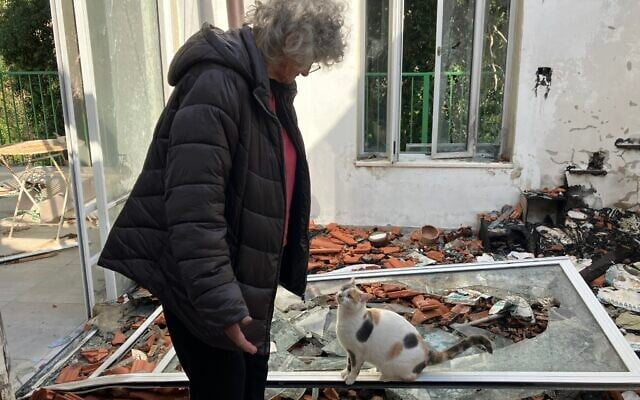 Michal Shaked looks down at her cat in her house on Kibbutz Hanita that was destroyed in an October 13, 2023, Hezbollah rocket attack on January 6, 2025. (Diana Bletter/Times of Israel)
Michal Shaked looks down at her cat in her house on Kibbutz Hanita that was destroyed in an October 13, 2023, Hezbollah rocket attack on January 6, 2025. (Diana Bletter/Times of Israel)Since then, some of the 60,000 evacuees have started to trickle back to their homes.
However, Kibbutz Hanita and Kibbutz Rosh Hanikra, as well as several other nearby communities adjacent to the northern border, are still closed military zones. Residents are allowed to come in but they cannot stay overnight. In the mornings, residents accompany construction workers who stay for the day to do repairs on houses that have been uninhabited for more than 15 months.
The IDF says it located and demolished five Hezbollah weapon depots in southern Lebanon, during recent operations amid the ongoing ceasefire.
The depots found by the 300th “Baram” Regional Brigade included over 200 mortars, primed rocket launchers, and other military gear, the military says.
The troops also located a truck-mounted rocket launcher.
The weapons were confiscated and the sites were demolished.
The IDF says it is working to “remove threats and terror infrastructure, in accordance with the understandings between Israel and Lebanon, while abiding by the ceasefire agreement.”
Ori Shaked stood in his destroyed studio apartment above his parents’ home on Kibbutz Hanita on Monday morning, surrounded by shards of glass and debris, and, picking up a blackened, charred object, he joked, “My iRobot almost survived.”
The Hezbollah terror group began striking northern Israel on October 8, 2023, one day after Hamas-led terrorists launched a shock attack in southern Israel, slaughtering some 1,200 people and abducting 251 hostages.
Among the casualties of the Hezbollah barrages was the Shaked family home on the edge of the kibbutz, facing southern Lebanon.
Ori and his parents weren’t there, said his mother, Michal, who was also surveying the wreckage on a rare visit home. She said she and her husband hadn’t wanted to evacuate the kibbutz, where she grew up. But on October 8, a mandatory evacuation was put into place for some 60,000 residents in 32 communities in northern Israel.
The family reluctantly left their home on October 9. The rocket hit four days later.
After more than a year of Hezbollah’s attacks on Israel, in which 45 civilians and 80 IDF soldiers and reservists were killed, the conflict was halted on November 27, 2024, with a 60-day temporary ceasefire in Lebanon.

Since then, some of the 60,000 evacuees have started to trickle back to their homes.
However, Kibbutz Hanita and Kibbutz Rosh Hanikra, as well as several other nearby communities adjacent to the northern border, are still closed military zones. Residents are allowed to come in but they cannot stay overnight. In the mornings, residents accompany construction workers who stay for the day to do repairs on houses that have been uninhabited for more than 15 months.
Nothing left to salvage
On Monday, the air was crisp and cool. Sunlight poured in between the wooden beams that once held up the A-frame roof of the Shaked family house.
Michal looked around the destroyed room as her cat wandered around the wreckage and padded delicately across a shattered window that lay in the middle of the room. Ori spotted his burned computer amid the cinders. Except for a few metal spoons, there was nothing left to salvage.
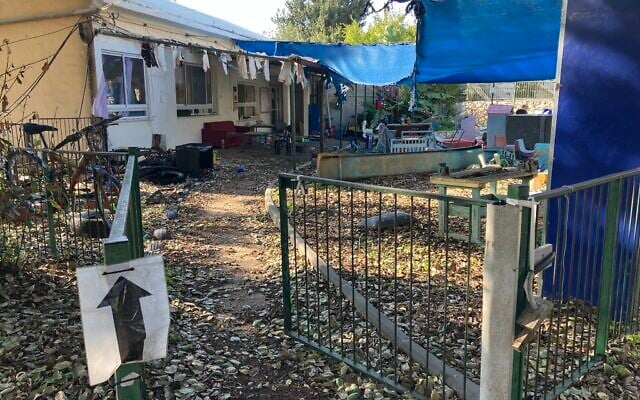 The entrance to a nursery school on Kibbutz Hanita that was hit in an October 2023 Hezbollah rocket attack on January 6, 2025. (Diana Bletter/Times of Israel)
The entrance to a nursery school on Kibbutz Hanita that was hit in an October 2023 Hezbollah rocket attack on January 6, 2025. (Diana Bletter/Times of Israel)After the war broke out, the family initially dismissed the idea of evacuating.
“We thought people were needlessly panicking,” she said.
On evacuation day, October 9 of last year, Michal and her husband packed up a few of their things for “three days,” she said. “We thought we’d be gone for three days. We’re still counting every three days.”
On Monday Michal returned to the kibbutz to get more clothes and prepare the house for renovations. She and her husband are staying in an apartment in Tivon, about 40 minutes away.
“We won’t have to flatten the house, but we have to repair everything,” Michal said. The process could take months.

After the war broke out, the family initially dismissed the idea of evacuating.
“We thought people were needlessly panicking,” she said.
On evacuation day, October 9 of last year, Michal and her husband packed up a few of their things for “three days,” she said. “We thought we’d be gone for three days. We’re still counting every three days.”
On Monday Michal returned to the kibbutz to get more clothes and prepare the house for renovations. She and her husband are staying in an apartment in Tivon, about 40 minutes away.
“We won’t have to flatten the house, but we have to repair everything,” Michal said. The process could take months.
The hilltop kibbutz
Kibbutz Hanita was established in 1938 at the top of a hill right on the border with south Lebanon. Before the war, about 750 people, including children, lived in the kibbutz.
A security fence presses up against the cement border wall that separates Israel from Lebanon and encircles the village. The community is nestled among trees, some burned from rocket fire. In the petting zoo, which hadn’t been damaged, a peacock wandered near chickens in a fenced-in pen.
The roads in the kibbutz are chewed up from tank treads, and everywhere are reminders of the war: sandbags, fallen rocket debris — now collector’s items — and gardens overgrown with weeds after more than a year of neglect.
“We want to return as soon as we can, but there’s no grocery store to buy food and no education system,” said Tal Hasid, a kibbutz member. The nursery school, hit by rockets, needs to be repaired. The electricity works, but the sewage system does not.
“Everything has to be built from zero,” said Hasid.
His family spent nine months in a hotel in Tiberias, which was very difficult, he said, and then they moved to an apartment in coastal Nahariya where “Hezbollah launched rockets at their building.”
“There is a lot of damage, but we think things will be okay here,” Hasid said.
He believes that people will start returning by February, which is when the government’s rent subsidies for evacuees currently are set to officially end. He said that some people have already started rebuilding and renovating. Others might wait until the close of the school year; others aren’t sure if they will return.

Ronit, a kibbutz member who asked that her last name not be used, stood on her tiptoes to peer at the trunk of an olive tree where cyclamen were growing.
“I came back to see the flowers,” Ronit said. “I am planted in this land.”
Ronit was born on the kibbutz, she said. Pointing to a building nearby, she said, “That was where I lived as a baby. Over there is the library and the water tower. I’ve missed all this.”
“Everything is okay, but everything isn’t okay,” she said. After more than a year away from her home, she said, seeing the flowers gives her hope.
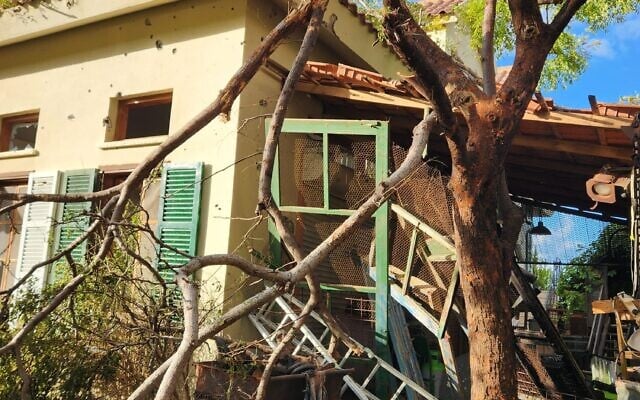
Rosh Hanikra
In coastal Kibbutz Rosh Hanikra, about 9 kilometers (5.5 miles) from Kibbutz Hanita to the east, Zeev Adini invited this reporter to see the damage to his house, hit by Hezbollah rocket fire in October 2024, soon after the IDF ground operation launched in southern Lebanon in late September.
With a wry smile, Adini said that his house was the only one in the kibbutz to get a direct hit from Hezbollah rockets.
His living room was full of antique furniture and bric-a-brac. He went through his vintage vinyl record collections and held up Don McLean’s “American Pie” album, which had been cracked in half during the attack. He noted that out of all his records, the only one that wasn’t damaged was an album by The Beatles.
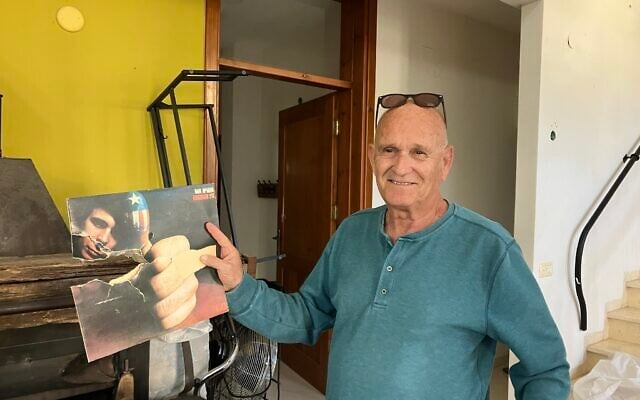 Zeev Adini holds up Don McLean’s American Pie album that was destroyed in an October 2024 Hezbollah rocket attack on January 6, 2025. (Diana Bletter/Times of Israel)
Zeev Adini holds up Don McLean’s American Pie album that was destroyed in an October 2024 Hezbollah rocket attack on January 6, 2025. (Diana Bletter/Times of Israel)The kibbutz grows bananas and avocados and raises turkeys. In the late 1980s, English actor Sacha Baron Cohen lived there for a time.
During this reporter’s visit, the streets were largely deserted and still until a boy rode by on his bicycle — a rare sight.
Adini said that he and his wife aren’t sure they want to move back into their house after they renovate it.
“It isn’t because of the security situation,” he said, looking toward the hill that marks Israel’s border with Lebanon. “We got used to living closer to our children in the center of the country.”
When the rocket hit his house, Adini was away. He said he sent messages to his family and friends and told them not to be upset.
“Let’s put things into proportion,” he wrote in October. “There are hostages in Gaza. The house and everything — it’s all just material objects.” link

The kibbutz grows bananas and avocados and raises turkeys. In the late 1980s, English actor Sacha Baron Cohen lived there for a time.
During this reporter’s visit, the streets were largely deserted and still until a boy rode by on his bicycle — a rare sight.
Adini said that he and his wife aren’t sure they want to move back into their house after they renovate it.
“It isn’t because of the security situation,” he said, looking toward the hill that marks Israel’s border with Lebanon. “We got used to living closer to our children in the center of the country.”
When the rocket hit his house, Adini was away. He said he sent messages to his family and friends and told them not to be upset.
“Let’s put things into proportion,” he wrote in October. “There are hostages in Gaza. The house and everything — it’s all just material objects.” link
West Bank and Jerusalem and Terror attacks within Israel
- 2 Palestinian children among 3 killed in West Bank drone strike; IDF said it targeted cell of gunmen
At least three Palestinians, including two children, were reportedly killed in the IDF’s drone strike this morning in the northern West Bank town of Tamun.
A security source cited by the official Palestinian news agency WAFA, says the dead include Reda Basharat, 9, Hamza Basharat, 10, and Adam Basharat, 23.
WAFA says that their bodies were taken by Israeli soldiers.
The IDF said earlier that it targeted a cell of gunmen, without immediately providing further details. There is no comment from the military about the reported deaths of the children.
At least three Palestinians, including two children, were reportedly killed in the IDF’s drone strike this morning in the northern West Bank town of Tamun.
A security source cited by the official Palestinian news agency WAFA, says the dead include Reda Basharat, 9, Hamza Basharat, 10, and Adam Basharat, 23.
WAFA says that their bodies were taken by Israeli soldiers.
The IDF said earlier that it targeted a cell of gunmen, without immediately providing further details. There is no comment from the military about the reported deaths of the children.
Politics and the War (general news)
- Amid coalition cracks, Shas MKs back state commission of inquiry into October 7
Members of the coalition Shas party come out in favor of a state commission of inquiry into October 7.
Addressing members of the October Council organization, which represents relatives of victims of the Hamas attack, Shas MK Yinon Azoulay states that he believes such a probe “should be established… as soon as possible,” Walla reports.
According to the Israel National News site, Shas MK Yosef Taieb tells the families that “a state commission of inquiry is needed but we will act in accordance with the directive of the Council of Torah Sages,” which runs the ultra-Orthodox party.
Interior Minister Moshe Arbel of Shas has also endorsed establishing a state commission of inquiry, in a letter to Attorney General Gali Baharav-Miara last August.
Prime Minister Benjamin Netanyahu has repeatedly rebuffed such calls, instead reportedly pushing for the creation of an alternative, political probe. link This is a good start but it is a far cry from them demanding the Commission or threatening to leave the government if an official commission is not set up. Just as with the hostage deal, they make statements of support but don't back it up with anything concrete. I'm afraid the same will happen here.
Members of the coalition Shas party come out in favor of a state commission of inquiry into October 7.
Addressing members of the October Council organization, which represents relatives of victims of the Hamas attack, Shas MK Yinon Azoulay states that he believes such a probe “should be established… as soon as possible,” Walla reports.
According to the Israel National News site, Shas MK Yosef Taieb tells the families that “a state commission of inquiry is needed but we will act in accordance with the directive of the Council of Torah Sages,” which runs the ultra-Orthodox party.
Interior Minister Moshe Arbel of Shas has also endorsed establishing a state commission of inquiry, in a letter to Attorney General Gali Baharav-Miara last August.
Prime Minister Benjamin Netanyahu has repeatedly rebuffed such calls, instead reportedly pushing for the creation of an alternative, political probe. link This is a good start but it is a far cry from them demanding the Commission or threatening to leave the government if an official commission is not set up. Just as with the hostage deal, they make statements of support but don't back it up with anything concrete. I'm afraid the same will happen here.
The Region and the World - US says it hit Houthi underground weapon storage facilities in Yemen strikes
The US Central Command says its forces conducted strikes against two Houthi underground advanced conventional weapon (ACW) storage facilities.
The facilities were in areas of Yemen controlled by the Iran-backed Houthis, CENTCOM says, and were used in attacks against US Navy warships and merchant vessels in the southern Red Sea and Gulf of Aden.
The US military says there were no injuries or damage to its personnel or equipment.
Personal Stories
The US Central Command says its forces conducted strikes against two Houthi underground advanced conventional weapon (ACW) storage facilities.
The facilities were in areas of Yemen controlled by the Iran-backed Houthis, CENTCOM says, and were used in attacks against US Navy warships and merchant vessels in the southern Red Sea and Gulf of Aden.
The US military says there were no injuries or damage to its personnel or equipment.
BROKEN DREAMS
Daniela dreams of visiting South Korea. This dream began to form in her heart following the series she watched - they made her interested in the culture and the place.
Omer planned to fly with his friends to South America. His friends are waiting for him to return so they can fly together soon.
Karina wants to rest, the create for herself a framework that will be good for her and to spend time with her friends. One of her areas of interests that she loves most is makeup- she wants to become a profession through course and work in the field
Dark Legacy - The Abandonment of October 7th Hostages
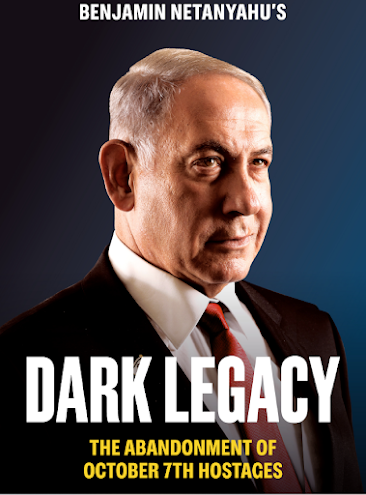
Negligence: It’s Policy, Not an ErrorNoa SattathReformist Rabbi, Executive Director of The Association for Civil Rights in Israel.
In Israel, the office of Prime Minister bears the highest responsibility in maintaining a functioning government. It exerts various authorities, as well as formal and informal powers, that facilitate the leadership of the country. It is the Prime Minister’s duty to use all means of governmental, political, and military defense tools to lead the country in the manner that is best for its citizens.Prime Minister Benjamin Netanyahu has been neglecting his leadership role for many years in order to cement his rule.Netanyahu has been forsaking the fabric of Jewish-Arab partnership by inciting the public against the Arab community in order to garner political profit. This has been going on for many years, and more so since 2015.He has eroded Israel’s structure of checks and balances by utilizing an incitement campaign against the media and against social services. He left Israel’s political system open to extremism, racism, and violence when he normalized and promoted the “Otzma Yehudit” (Jewish Power) party and its representatives to senior offices in the country’s administration.Netanyahu’s negligence has reached new heights since the last election, as he went after Israel’s democratic institutions by promoting a dangerous judicial coup, all while disregarding Israel’s security in favor of that coup.Since the beginning of the war, however, we have witnessed a new kind of neglect. The Prime Minister systematically ignores all of the tools at his disposal for the sake of cruel, abusive, and relentless use of violence and force.Rather than restoring the public’s wavering faith in the ability of the law enforcement systems to protect them, the Prime Minister has allowed unrestricted distribution of guns to hundreds of civilians. These guns will inevitably be used to perpetrate violence against women, and by people who wish to harm themselves. They will accidentally harm innocent people or will be used by crime syndicates. In addition, Netanyahu allows, legitimizes, and encourages unrestrained use of police violence against protesters while inciting against the protesters themselves.In the West Bank, the Prime Minister supports unprecedented and appalling violence by settlers against Palestinians, forsaking his responsibility by letting the hardline extremist religious-nationalist representatives of the Hilltop Youths in his administration run the area to their Messianic heart’s content.In addition to all these, and perhaps even first among them, is Netanyahu’s conduct while running the war. He continuously violates international law, commits war crimes, uses unchecked power that harms the innocent, and endangers the country’s security in a war that has no clear-cut goals and whose end game is unattainable. This conduct delays, and is meant to delay, the achievement of a hostage release deal, leaving the hostages— who have been neglected since the very moment they were taken— suffering extremely since, in an incomprehensible cycle of disaster.This is just the tip of the iceberg, even before mentioning the collapse of the state’s education system, the Arab community’s emergency situation in dealing with internal violence, depleted social services, and a public health system in deep crisis. Layers upon layers of negligence are the Prime Minister’s legacy. Wherever you look there is a trail of neglect and collapse.Only when we will be able to rise from the ruins and begin rebuilding will we understand the depth of negligence for which Benjamin Netanyahu is responsible as Israel’s Prime Minister over the last two decades.

Acronyms and Glossary
ICC - International Criminal Court in the Hague
IJC - International Court of Justice in the Hague
MDA - Magen David Adom - Israel Ambulance Corp
PA - Palestinian Authority - President Mahmud Abbas, aka Abu Mazen
PMO- Prime Minister's Office
UAV - Unmanned Aerial vehicle, Drone. Could be used for surveillance and reconnaissance, or be weaponized with missiles or contain explosives for 'suicide' explosion mission
Join my Whatsapp update group https://chat.whatsapp.com/IQ3OtwE6ydxBeBAxWNziB0
Twitter - @LonnyB58 Bluesky - @lonny-b.bsky.social
Twitter - @LonnyB58



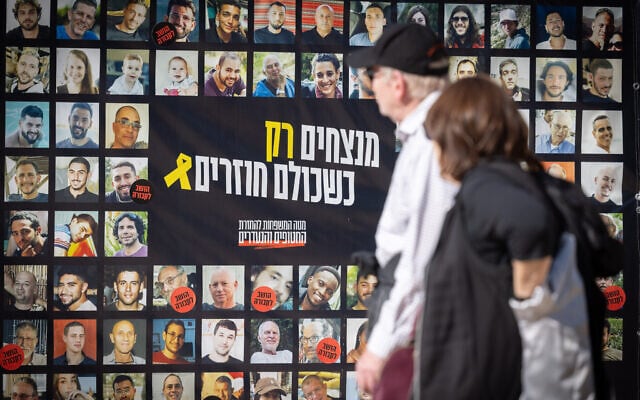
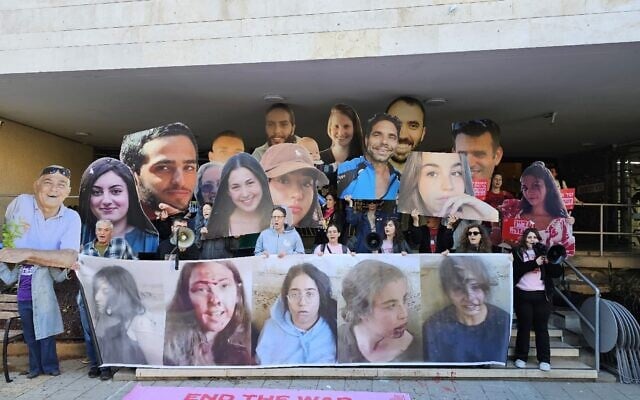


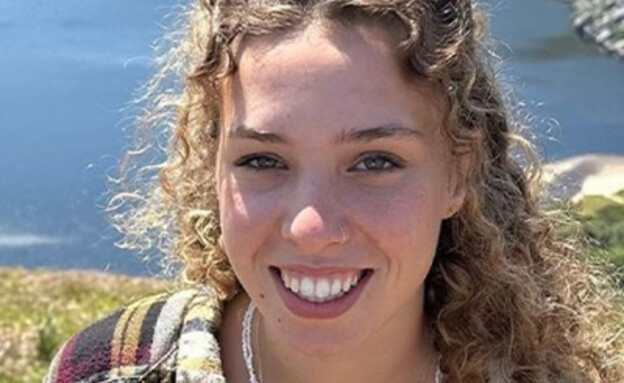


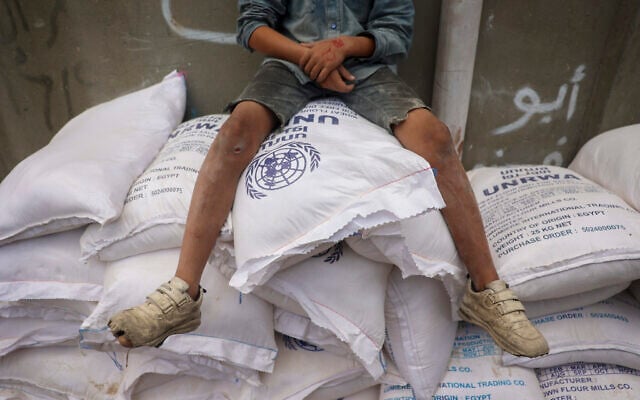
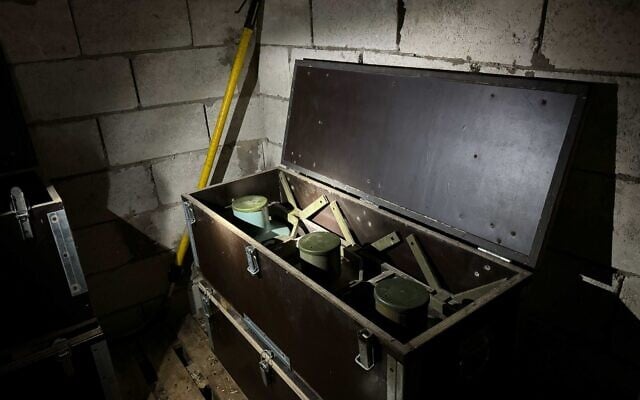
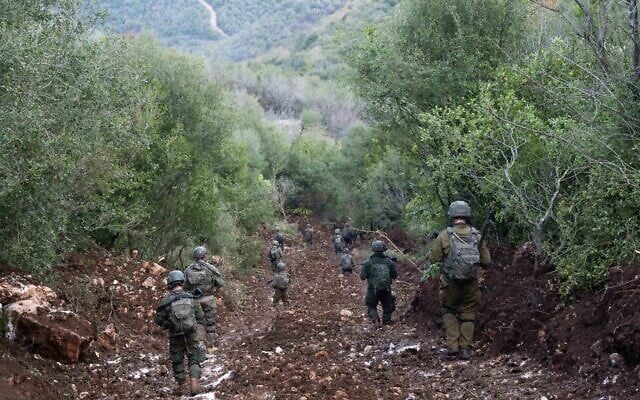
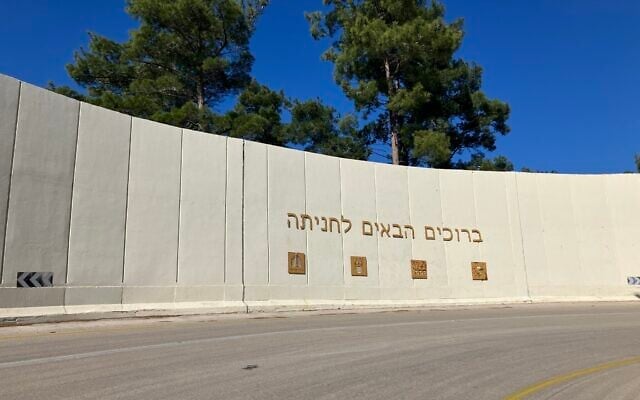
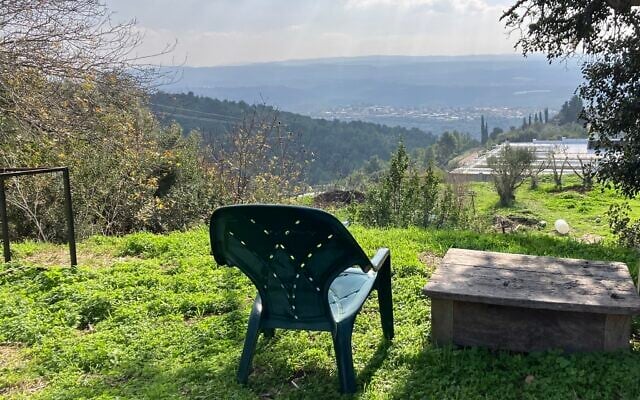
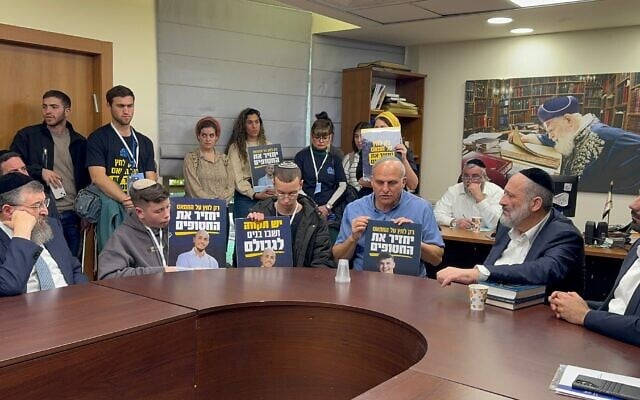





Comments
Post a Comment